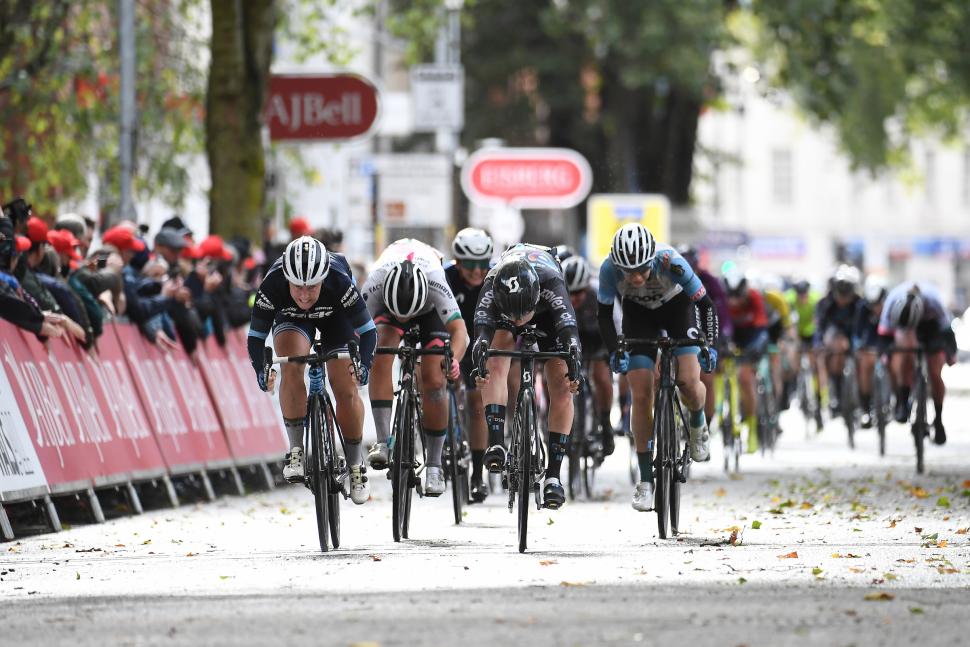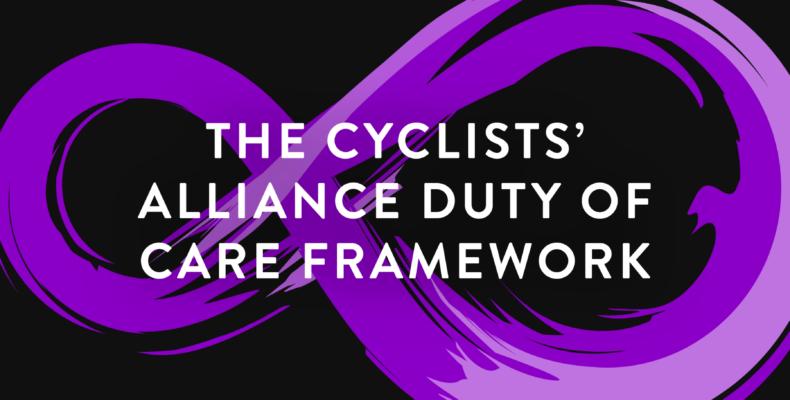- News
- Reviews
- Bikes
- Components
- Bar tape & grips
- Bottom brackets
- Brake & gear cables
- Brake & STI levers
- Brake pads & spares
- Brakes
- Cassettes & freewheels
- Chains
- Chainsets & chainrings
- Derailleurs - front
- Derailleurs - rear
- Forks
- Gear levers & shifters
- Groupsets
- Handlebars & extensions
- Headsets
- Hubs
- Inner tubes
- Pedals
- Quick releases & skewers
- Saddles
- Seatposts
- Stems
- Wheels
- Tyres
- Tubeless valves
- Accessories
- Accessories - misc
- Computer mounts
- Bags
- Bar ends
- Bike bags & cases
- Bottle cages
- Bottles
- Cameras
- Car racks
- Child seats
- Computers
- Glasses
- GPS units
- Helmets
- Lights - front
- Lights - rear
- Lights - sets
- Locks
- Mirrors
- Mudguards
- Racks
- Pumps & CO2 inflators
- Puncture kits
- Reflectives
- Smart watches
- Stands and racks
- Trailers
- Clothing
- Health, fitness and nutrition
- Tools and workshop
- Miscellaneous
- Buyers Guides
- Features
- Forum
- Recommends
- Podcast
 AJ Bell Women's Tour credit: SWpix DSC_4571.JPG
AJ Bell Women's Tour credit: SWpix DSC_4571.JPGCyclists' Alliance partner with Supersapiens for Duty of Care framework to improve wellbeing of female pro peloton
Image: SWpix
The Cyclists' Alliance (TCA) has partnered with sports performance company Supersapiens for a new initiative called ‘The Cyclists' Alliance Duty of Care Framework’ to ensure that female professional athletes are empowered and nurtured, both physically and mentally.
The foundation aims to provide holistic support to professional female cyclists during and after their careers, and is run by current and former pros including two-time Australian national road champion Gracie Elvin and former Dutch rider Roos Hoogeboom.
The new framework has been introduced to “assist all stakeholders who play a part in the elite performance of female professional cyclists to put their mental and physical well-being first to optimising the athlete’s overall wellbeing in conjunction with performance excellence to ensure that no athlete can unknowingly or knowingly push their body past its limitations and cause disastrous long-term effects on the mind, body and its systems”.
Gracie of TCA says: “Using evidence-based research and a panel of industry experts, with the support from Supersapiens, will enable us to push for a higher standard of health, well-being, and duty of care in professional women’s cycling.”
The US-based sports company Supersapiens produces on-the-go blood glucose tracking for easier energy management, and is involved as a funding and research partner.
“We’re honoured to have the opportunity to work with TCA to help optimise the overall wellbeing of female athletes and empower each rider to reach her highest level of performance, both on and off the bike, to create a better tomorrow for the women’s peloton,” Phil Southerland, CEO and Founder of Supersapiens says.
“Scientifically it’s going to take time,” Phil acknowledges, “but we just want to support all the female athletes in the peloton to help them be the best for themselves and also to be great ambassadors for the sport.
“In the world of cycling power to weight ratio is that beautifully stressful metric you’re striving for, what we’re seeing in the data of female athletes is that there’s different fueling needs, different energy demands over the different phases of the cycle.
“If an athlete is blindly trying to lose weight off a certain diet and it’s not working, the mental stress and anxiety that causes is going to prohibit them from being a good athlete and, most importantly, prevent them from being happy.
> Supersapiens launches Energy Band to give real-time glucose data and help you maximise performance
“We’ve invested in the Female Athlete Endurance Project in Norway to better understand how the female body changes and what the fuel needs are over the different stages of the cycle.
"We’re doing whatever we can to provide a product to the women’s peloton and help them become educated on how their body responds to fuel, to training, any day of the month, so that they can make the best decisions for themselves.”
The proposed TCA Duty of Care Framework aims are (in TCA's own words):
- Educating and helping athletes to recognise symptoms and develop a range of self-management skills that they can utilise to manage physical or psychological distress through educational resources and workshops
- Equipping key stakeholders in the elite sporting environment (such as team managers, coaches, sports directors, medical staff and high-performance support staff) to better understand, recognise and respond to concerns regarding an athlete’s mental and physical health through an annual conference/training/certification and
- Creating a minimum requirement of medial test and checks that athletes must meet in order to compete (to ensure the UCI current list is updated to cater to female athletes and that there is a clear roadmap to incorporate mandatory medical checks for both WWT & Continental teams to safeguard all riders
TCA says the following topics will be created and delivered by experts, and backed up by evidence-based research: Menstrual Health & Contraceptive, Breast Health, RED-S (Relative energy deficiency), Concussion, Cardiac screening, Exercise-induced arterial endofibrosis (EIAE) and more.
> Female optimised training: how to work with your menstrual cycle for optimal fitness
As well as the new Duty of Care Framework, TCA is advocating for the national and international governing bodies of cycling to implement the following minimum standards (in TCA's own words):
- All riders to earn a minimum salary
- All riders to receive maternity leave (not just for WTT riders)
- All racing and training expenses covered
- Paid vacation days and a mandatory minimum vacation block
- All support team members to be qualified, checked and professional
- All riders to receive life insurance, permanent total disability insurance and repatriation insurance as standard
- A universal standardised approach to race safety
If you want to support TCA's fight for fairness for the women’s peloton, visit www.cyclistsalliance.org for information on its Supporter (€35), Rider Sponsor (€60) and Sponsor (donations from €500) packages.
TCA has gained 193 members from 37 different teams and 32 different countries, launched a Contract Management platform, advised over 25 riders how to improve their contract before signing, led a successful arbitration on behalf of a rider against a team and more since it came together two years ago to support female cyclists during and after their careers.
Anna has been hooked on bikes ever since her youthful beginnings at Hillingdon Cycle Circuit. As an avid road and track racer, she reached the heady heights of a ProCyclingStats profile before leaving for university. Having now completed an MA in Multimedia Journalism, she’s hoping to add some (more successful) results. Although her greatest wish is for the broader acceptance of wearing funky cycling socks over the top of leg warmers.
Latest Comments
- eburtthebike 57 min 12 sec ago
A sad case, and one with no winners. The driver can thank her lucky stars that the cyclist wasn't more seriously injured and that the court was...
- AidanR 1 hour 53 min ago
Bloody hell... How are you doing now?
- ktache 2 hours 2 min ago
And I liked endura too. Got a nice long sleeve mostly merino long sleeve a little while back, in orange.
- matthewn5 2 hours 30 min ago
No, the Ebay lights have been around for several years, this Lezyne light just appeared.
- chrisonabike 2 hours 46 min ago
They shouldn't worry - the second part of the "tariff" refrain is "they can make it in US and they'll do very well".
- Mr Blackbird 3 hours 18 min ago
"At the going down of the sun, it will get in our eyes and cause us to crash into things."
- Rendel Harris 3 hours 26 min ago
Been living in the area thirty years now and Brixton Cycles (and local riders wearing their famed Rastafarian colours jersey) has been an iconic...
- chrisonabike 5 hours 31 min ago
Does the "super-loud yellow" also help alert (non-deaf / non-earbud-wearing) pedestrians? Or will it just mean dogs bark at me?
- chrisonabike 8 hours 22 min ago
Indeed - but again these are perhaps questions we should keep asking. Even if the immediate answer is "well we are where we are" or "how on earth...

Add new comment
3 comments
Im all for fairness in the pro peloton but this feels like a lot of word salad here... I guess I'll just consign myself to the Stone Age.
My first though was how much applies to the Male pro's today. Not that I'm againsts aspirations for better quality of life at work, but just curious how much is closing the gap to the men and how much is on top of what the men currently get. (Paternity leave for instance).
Fair play to them - although its not particularly clear how they are going to affect these changes.
6 of the 7 points are covered in any decent workplace - sector minimum wage is missing, but it wouldn't entirely surprise me if many women were on statutory minimum wage or less.
Pro riders are at work. Why shouldn't they get the same protections and benefits as any other employee*, even if they are on fixed term contracts?
*Usual bastard employers excepted